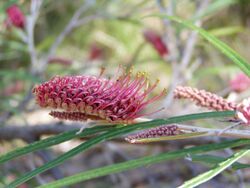Biology:Grevillea aspleniifolia
| Grevillea aspleniifolia | |
|---|---|

| |
| In the Australian National Botanic Gardens | |
| Scientific classification | |
| Kingdom: | Plantae |
| Clade: | Tracheophytes |
| Clade: | Angiosperms |
| Clade: | Eudicots |
| Order: | Proteales |
| Family: | Proteaceae |
| Genus: | Grevillea |
| Species: | G. aspleniifolia
|
| Binomial name | |
| Grevillea aspleniifolia Knight[2]
| |
| Synonyms[2] | |
| |
Grevillea aspleniifolia, also known as fern leaf grevillea,[3] is a species of flowering plant in the family Proteaceae and is endemic to eastern New South Wales. It is a spreading shrub with linear to narrowly egg-shaped leaves and purplish flowers.
Description
Grevillea aspleniifolia is a spreading shrub that typically grows to 1–5 m (3 ft 3 in–16 ft 5 in) high and up to 5 m (16 ft) wide. The leaves are linear to narrowly egg-shaped, 150–250 mm (5.9–9.8 in) long and 3–15 mm (0.12–0.59 in) wide with irregular serrations and a woolly-hairy lower surface, the edges turned down or rolled under. The flowers are arranged in toothbrush-like racemes along a rachis usually 30–50 mm (1.2–2.0 in) long, and are purplish with grey or white hairs. The pistil is mostly 15–25 mm (0.59–0.98 in) long and the style has a green tip. Flowering mainly occurs from July to November and the fruits is a hairy follicle 11–12 mm (0.43–0.47 in) long.[4][5][6][7]
Taxonomy
Grevillea aspleniifolia was first formally described in 1809 by Joseph Knight in On the cultivation of the plants belonging to the natural order of Proteeae.[8][9] The specific epithet (aspleniifolia) means ''Asplenium-leaved".[6]
Distribution and habitat
This grevillea grows in woodland on sandstone or shale in the catchments of the Warragamba Dam and Woronora River, and near Bungonia Caves, in eastern New South Wales.[5][4]
Use in horticulture
Grevillea aspleniifolia is reported to be a hardy, fast-growing plant that tolerates heavy soil as long as the soil is well-drained. A sunny position is preferred.[6]
Conservation status
This species is listed as "Near Threatened" on the IUCN Red List of Threatened Species. It has a restricted distribution and a naturally severely fragmented population, where it occurs in several small, isolated subpopulations. Threats to this species include damage and/or grazing by introduced deer and changed fire regimes.[1]
References
- ↑ 1.0 1.1 Makinson, R. (2020). "Grevillea aspleniifolia". IUCN Red List of Threatened Species 2020: e.T112646396A113309195. doi:10.2305/IUCN.UK.2020-2.RLTS.T112646396A113309195.en. https://www.iucnredlist.org/species/112646396/113309195. Retrieved 20 December 2023.
- ↑ 2.0 2.1 "Grevillea aspleniifolia". Australian Plant Census. https://biodiversity.org.au/nsl/services/apc-format/display/98113.
- ↑ "Grevillea aspleniifolia". Atlas of Living Australia. https://bie.ala.org.au/species/https://id.biodiversity.org.au/node/apni/2909578.
- ↑ 4.0 4.1 Makinson, Robert O.. "Grevillea aspleniifolia". Royal Botanic Garden Sydney. https://plantnet.rbgsyd.nsw.gov.au/cgi-bin/NSWfl.pl?page=nswfl&lvl=sp&name=Grevillea~aspleniifolia.
- ↑ 5.0 5.1 Makinson, Robert O.. "Grevillea aspleniifolia". Australian Biological Resources Study, Department of Agriculture, Water and the Environment: Canberra. https://profiles.ala.org.au/opus/foa/profile/Grevillea%20aspleniifolia.
- ↑ 6.0 6.1 6.2 Howes, Jeff (August 2021). "Grevillea aspleniifolia". Australian Plants Society New South Wales. https://resources.austplants.com.au/plant/grevillea-aspleniifolia/.
- ↑ Wood, Betty. "Grevillea aspleniifolia". Lucid Keys. https://apps.lucidcentral.org/plants_se_nsw/text/entities/grevillea_aspleniifolia.htm.
- ↑ "Grevillea aspleniifolia". APNI. https://id.biodiversity.org.au/instance/apni/523796.
- ↑ Knight, Joseph (1809). On the cultivation of the plants belonging to the natural order of Proteeae. p. 120. https://archive.org/details/oncultivationpl00kniggoog/page/n143/mode/2up. Retrieved 6 December 2021.
Wikidata ☰ Q2710353 entry
 |


